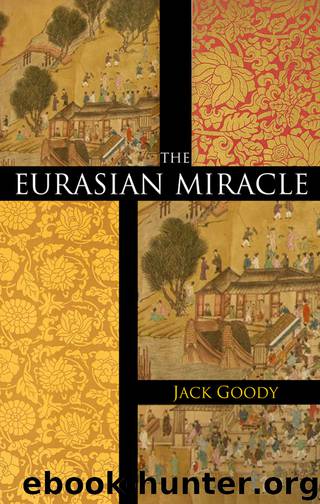The Eurasian Miracle by Goody Jack

Author:Goody, Jack.
Language: eng
Format: epub
Publisher: John Wiley & Sons, Inc.
Published: 2011-12-08T16:00:00+00:00
7
Towards a knowledge society
We have spoken of the circulation of information as well as of objects, but the former has further parameters. It depends on different forms of communication (linguistic, as distinct from transport) and it increasingly involves a different set of specialists: scholars rather than traders. But it has become increasingly important over the past centuries.
All societies, of course, are knowledge societies. That’s what ‘culture’ is, partly knowledge and communication, which can be transferred and handed down because of the great human capacity of speech. It is the development of speech that has enabled Homo sapiens (or perhaps earlier forms) to become modern humans, to elaborate an ‘extra-somatic culture’ as the American anthropologist Kroeber, and others, characterized it, and to store, transfer and develop that knowledge for our offspring. As a recent view of evolution remarks: ‘our own nominally civilized level of life emerged when organisms stumbled on a way of passing on intricate, unpredictable information to others around them. It did so by inventing language and effectively binding together all human organisms, past, present, and future into a single mega-organism of potentially boundless achievement.’1 The author sees this as a continuation of biological selection; in fact, in represents a break with that mode of information transmission, so often more flexible, but involving some of the same very general ‘principles’, such as selection.
These features I have referred to as ‘the technologies of the intellect’, partly to bridge the gap between technology and the cognitive sciences. One thing that earlier anthropologists have taught us is that societies with only oral communication can be very complicated. Human society became much more so (perhaps began) with the invention of speech, giving rise, I would suggest, to thought itself, or to ‘higher consciousness’ in the words of the Russian psychologist Vygotsky. The so-called ‘human revolution’ took place with the dispersal of Homo sapiens from Africa some 60,000 years ago (according to DNA evidence) with a fully developed language.2 The revolution has often been associated with France and with the appearance of cave art.3 But cave art had a rather limited distribution in southern France and northern Spain. Anyhow, the point is that, given this technology of the intellect – that is, speech – humans developed what we call ‘a culture’, once it enabled us to communicate quite differently, one to another.
At first such transmission was very slow and conservative by today’s standards. In the Lower and Middle Palaeolithic, human achievements had been broadly similar in various parts of the world, for example in hand-axe cultures. Take an Acheulian instrument whose form persisted over thousands of years in many parts of the globe. This was not simply ‘functional’ – there are many ways of killing a bison – but a cultural element was involved in the adoption and continued use of the type. The Upper Palaeolithic saw the advent of modern humans with a fully fledged language, leading to what has been called the ‘human revolution’. This cultural element is more obvious when we
Download
This site does not store any files on its server. We only index and link to content provided by other sites. Please contact the content providers to delete copyright contents if any and email us, we'll remove relevant links or contents immediately.
| Africa | Americas |
| Arctic & Antarctica | Asia |
| Australia & Oceania | Europe |
| Middle East | Russia |
| United States | World |
| Ancient Civilizations | Military |
| Historical Study & Educational Resources |
The Sympathizer by Viet Thanh Nguyen(4390)
The Rape of Nanking by Iris Chang(4211)
World without end by Ken Follett(3476)
Ants Among Elephants by Sujatha Gidla(3467)
Blood and Sand by Alex Von Tunzelmann(3203)
Japanese Design by Patricia J. Graham(3174)
The Queen of Nothing by Holly Black(2599)
City of Djinns: a year in Delhi by William Dalrymple(2555)
Foreign Devils on the Silk Road: The Search for the Lost Treasures of Central Asia by Peter Hopkirk(2464)
India's Ancient Past by R.S. Sharma(2454)
Inglorious Empire by Shashi Tharoor(2437)
Tokyo by Rob Goss(2429)
In Order to Live: A North Korean Girl's Journey to Freedom by Yeonmi Park(2391)
Tokyo Geek's Guide: Manga, Anime, Gaming, Cosplay, Toys, Idols & More - The Ultimate Guide to Japan's Otaku Culture by Simone Gianni(2373)
India's biggest cover-up by Dhar Anuj(2354)
The Great Game: On Secret Service in High Asia by Peter Hopkirk(2349)
Goodbye Madame Butterfly(2253)
Batik by Rudolf Smend(2181)
Living Silence in Burma by Christina Fink(2071)
